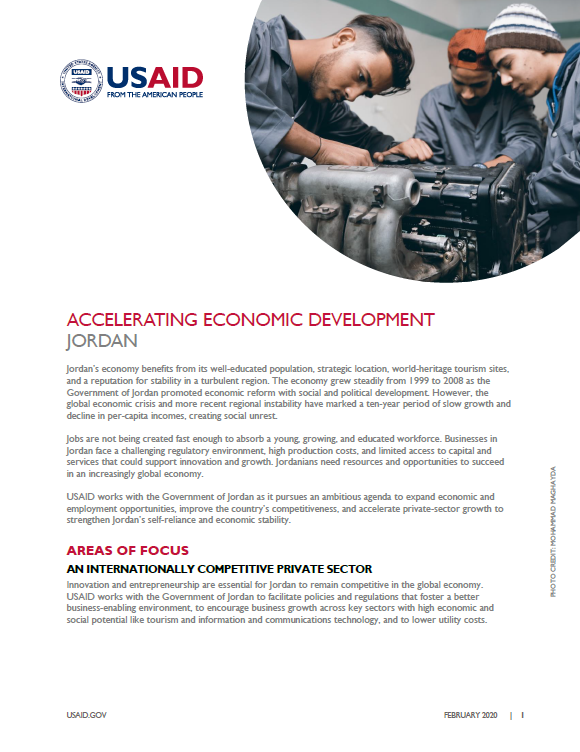Speeches Shim

BACKGROUND
Jordan’s economy benefits from its well-educated population, strategic location, world-heritage tourism sites, and a reputation for stability in a turbulent region. The economy grew steadily from 1999 to 2008 as the Government of Jordan promoted economic reform with social and political development. However, the global economic crisis and more recent regional instability have marked a ten-year period of slow growth and decline in per-capita incomes, creating social unrest.
Jobs are not being created fast enough to absorb a young, growing, and educated workforce. Businesses in Jordan face a challenging regulatory environment, high production costs, and limited access to capital and services that could support innovation and growth. Jordanians need resources and opportunities to succeed in an increasingly global economy.
USAID works with the Government of Jordan as it pursues an ambitious agenda to expand economic and employment opportunities, improve the country’s competitiveness, and accelerate private-sector growth to strengthen Jordan’s self-reliance and economic stability.
AREAS OF FOCUS
Accelerating Economic Development ![]() (pdf - 221k)
(pdf - 221k)
An Internationally Competitive Private Sector
Innovation and entrepreneurship are essential for Jordan to remain competitive in the global economy. USAID works with the Government of Jordan to facilitate policies and regulations that foster a better business-enabling environment, to encourage business growth across key sectors with high economic and social potential like tourism and information and communications technology, and to lower utility costs.
Inclusive and Accessible Jobs
Women and youth in Jordan face disproportionately high unemployment rates, and less than one-fifth of women participate in the workforce. USAID works with the private sector and government to address barriers to employment. To ensure that more people in Jordan, including women and youth, have the skills and opportunities that match the market’s needs, USAID trains individuals in skills that meet the economy’s demands and gives them access to resources to establish and expand businesses.
Strong Public Financial Management
Strong, transparent public financial management enables the government to use public resources more efficiently and bolsters financial sustainability. USAID helps governing institutions establish tighter controls on government expenditures, increase budget transparency to build accountability and reduce opportunities for corruption, and strengthen partnerships with the private sector to encourage innovation and cost-efficiency in service delivery.
NOTEWORTHY ACHIEVEMENTS
-
Small and medium enterprises employ two-thirds of Jordan’s private-sector workforce and their success can drive inclusive growth. Since 2015, USAID has facilitated more than 400 million USD in investment, largely through supporting the Jordan Investment Commission to develop regulations and processes to activate the 2014 Investment Law.
-
Jordan jumped ahead 29 places on the World Bank’s 2020 Doing Business Report from 104 to 75, making it the second most improved business climate worldwide from the 2019 rankings. USAID helped the Government of Jordan introduce two of three reforms that led to this improvement: the modernization of the tax system and the development of a collateral registry to allow businesses to access credit more easily.
-
Since 2016, more than 5,000 youth have graduated from professional training programs linked to full-time employment that were launched by USAID in partnership with the private sector. In 2019, the Jordan Hotel Association took on full management of one of these programs – Pathways to Professionalism – offering multiple levels of nationally certified on-the-job training for hospitality professionals in more than 30 hotels throughout Jordan.
-
USAID facilitated Jordan’s use of the Jordan-U.S. Free Trade Agreement, with trade between Jordan and the United States increasing from 568 million USD in 2001 to more than 3 billion USD in 2019. International trade agreements make it possible for Jordan’s businesses to access new markets and grow. These opportunities translate into increased economic productivity, expanded employment for the people of Jordan, and longer-term growth.



Comment
Make a general inquiry or suggest an improvement.